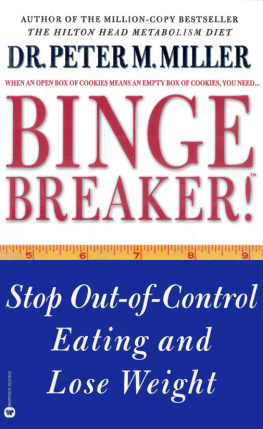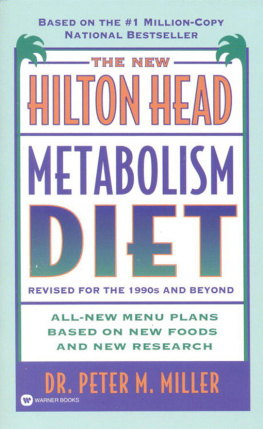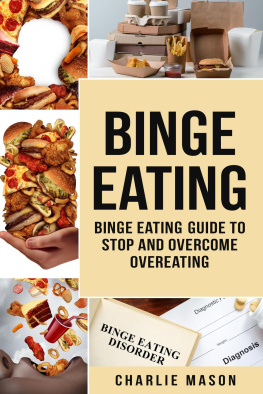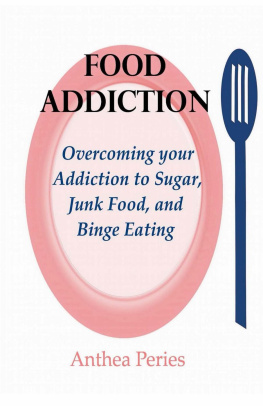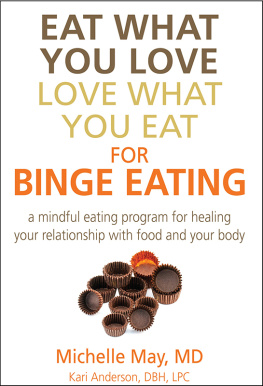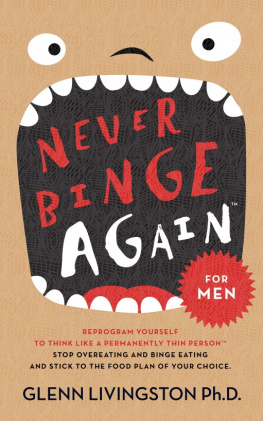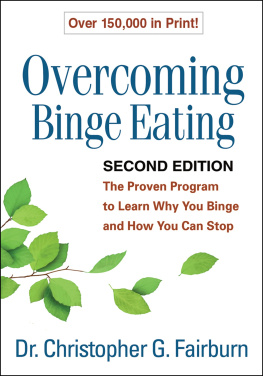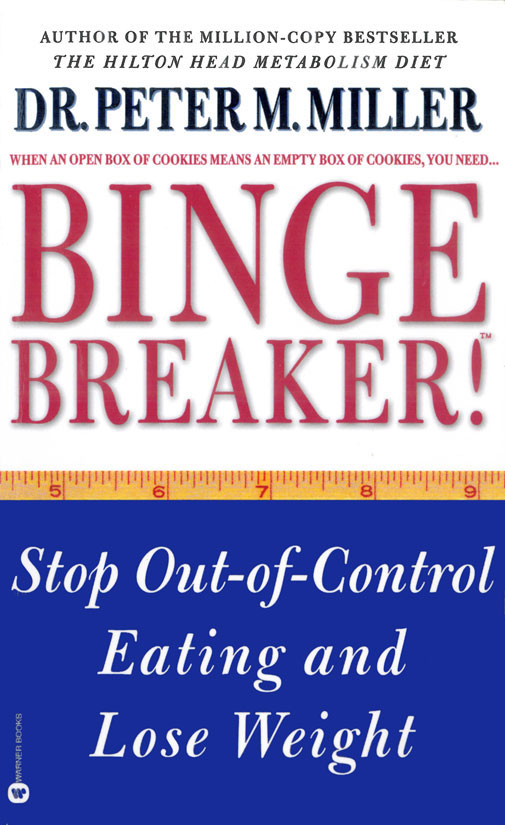PUBLISHERS NOTE: The program herein is not intended to replace the services of trained health professionals or be a substitute for medical advice. You are advised to consult with your health care professional with regard to matters relating to your health, and in particular regarding matters that may require diagnosis or medical attention.
MEDICAL CAUTION: The exercise program described in this book involves moderate-paced walking and is designed for overweight individuals who are relatively healthy. If you have special medical problems such as heart trouble, high blood pressure, respiratory problems, or recurrent back pain, check with your physician before starting.
Binge Breaker! is a trademark of Peter M. Miller, Ph.D.
Copyright 1999 by Peter Miller, Ph.D.
All rights reserved.
Warner Books, Inc., Hachette Book Group,
237 Park Avenue, New York, NY 10017
Visit our Web site at www.HachetteBookGroup.com.
A Time Warner Company
The Warner Books name and logo are trademarks of Hachette Book Group, Inc.
ISBN: 978-0-446-93074-1
Book design by Giorgetta Bell McRee
IF YOU BELIEVE YOU ARE A BINGE EATER, YOU NO LONGER HAVE TO SUFFER IN SILENCE. YOU ARE NOT ALONE!
Anne, a 35-year-old graphic designer, learned as a child to keep negative feelings to herself. Instead, she would eat when she felt angry, resentful, and depressed. As an overweight adult, she went on one diet after another and lost weight, but inevitably binged and gained it back.
Alex, 35, saw foods as either acceptable or forbidden. As a result, he was either starving himself on liquid diets or binge eating. One cookie became a binge because hed been bad, and guilt and self-blame caused him to lose confidence in his ability to get back in control.
Elizabeth, 50, had spent her life pleasing others. She had grown up as the good girl, always trying to please her perfectionist parents. As an adult, people took advantage of her nature to the point that she was feeling used and abused but couldnt do anything about itexcept binge.
The strategies in this book showed these people and many others how to eat sensibly and end their self-destructive cycles. You too can be a
BINGE BREAKER!
OTHER BOOKS BY DR. PETER M. MILLER
The New Hilton Head Metabolism Diet
The Hilton Head Diet for Children and Teenagers
The Hilton Head Over-35 Diet
If Im So Smart, Why Do I Eat Like This?
(with Howard Rankin)
The Hilton Head Executive Stamina Program
The Hilton Head Metabolism Diet
Selfwatching: Addictions, Habits, Compulsions: What to Do About Them
(with Ray Hodgson)
Personal Habit Control
Alternatives to Alcohol Abuse
(with Marie Mastria)
Behavioral Treatment of Alcoholism
To Gabrielle, my best friend, always and forever, darlin
To maintain professional confidentiality, the names of clients serving as case examples in this book have been changed. In some cases I have modified other relevant descriptive characteristics to further respect the privacy of my clients as well as disguise their identities.
Beyond Overeating
A fter spending most of her adult life unsuccessfully trying to lose weight, Janet finally found a diet that gave her hope. After a month of dieting, she had lost 12 pounds and her spirits were high.
Then, at 4:15 Tuesday afternoon, self-restraint came to a screeching halt. Janet was home alone feeling bored, tense, and restless. Her day had been stressful and hectic. Her husband was out of town on business and would not be home that evening. She felt very hungry, strongly craving something sweet.
She just had to eat something. To keep dietary damage to a minimum she fixed herself an English muffin with nothing on it. She finished it quickly, experiencing little satisfaction. She fixed another, but this time smothered it with strawberry jam. She ate rapidly, feeling driven to eat more. Rummaging around the kitchen, Janet found an opened package of Oreo cookies that her daughter had brought into the house. The package was still about three-quarters full. Almost without thinking she turned on the television, sat down, and proceeded to eat one cookie after another until the package was empty. As she was eating, Janet felt that she was unable to control what or how much she was eating. She felt uncomfortably full.
When the impact of what she had done finally hit her, she experienced an extreme feeling of selfdisgust, anger, and guilt. She later described her thoughts and feelings to me in this way:
I felt totally defeated. I began thinking, Now Ive really blown it. Stupid! Stupid! Stupid! Ill never do it. This happens every time I try to lose weight. What is wrong with me? Who cares anyway? It doesnt really matter. Nothing matters. Ill never be able to lose weight. Things will never change. Ill always be fat.
With that, Janet gave up. She had planned to eat a low-fat, low-calorie frozen meal for dinner but instead she picked up the telephone and ordered a medium pepperoni pizza with extra cheese to be delivered. After she ate the pizza, her mood became even more negative. She felt embarrassed, depressed, and hopeless. She stopped dieting and exercising and over the next three weeks gained back all the weight she had lost.
If Janets experience sounds familiar, you may be suffering from a newly described eating syndrome known as binge-eating disorder, an eating problem that keeps thousands of women and men from successfully losing weight and keeping it off. Recent studies have shown there is a subgroup of overweight individuals who have a serious problem with persistent out-of-control eating. Successful dieting is not possible unless this basic eating problem is overcome.
BINGE-EATING DISORDER: THE DIETERS DOWNFALL
Even with the best diets available, you may find it difficult to lose weight and impossible to keep it off once the weight is lost. I found this out with the dietary program that I prescribe in my book The New Hilton Head Metabolism Diet. Over a million and a half overweight people have followed this popular plan with the majority doing very well. However, some readers complained to me that their temptation to binge eat was too great to allow them to follow low-fat, low-calorie menus consistently.
Over the past 10 years behavioral scientists have begun an intense investigation of people whose periodic out-of-control eating goes beyond simple overeating. The finding of these studies is that as many as 30 percent of people who seek help for weight loss treatment suffer from what has now officially been diagnosed as binge-eating disorderoften referred to by its initials, BED. This syndrome is characterized by periodic episodes of compulsive overeating, or out-of-control eating, that severely hampers attempts at successful weight control.
Binge eaters overindulge when they are alone and they typically feel disgusted, depressed, and embarrassed afterward. They eat large amounts of food even when they are not physically hungry. This eating is much more rapid than usual and continues until the binge eater is uncomfortably full.
If you have binge-eating disorder it will keep you from losing weight. While many people with this problem can lose some weight in the short term, it is almost impossible for them to keep the weight from returning. Because of their binge eating they often gain their weight back quite rapidly.
THE EXTENT OF THE PROBLEM

